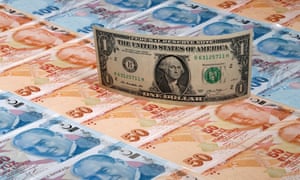
Turkey’s lira continued its recovery on Thursday, ahead of a crucial conference call between the country’s finance minister and international investors.
It rose 2.5% in early trading, with one dollar buying 5.8 lira. A diplomatic spat with the US helped send the lira into a tailspin last week and it hit a record low of 7.2 to the dollar on Monday, sending tremors through emerging markets. However, the lira remains about 20% below where it was a month ago.
European stock markets pushed higher on Thursday, with the FTSE 100 index in London up 0.6%. China’s announcement that it would send a trade delegation to the US soon has also cheered markets.
Berat Albayrak, President Recep Tayyip Erdoğan’s son-in-law who became treasury and finance minister last month, faces a tough test when he addresses international investors and analysts at 2pm BST, with 3,000 people expected to dial in. However, he will not take live questions and will only answer questions submitted in advance, the Financial Times reported, citing a government official.
Turkey’s authorities have responded to the currency meltdown with a number of measures that have underwhelmed analysts. On Monday, the central bank pledged to inject liquidity for banks and gave them more breathing space by cutting lira and foreign currency reserve requirements. However, it did not raise interest rates to curb inflation, as favoured by many analysts, with Erdoğan opposed to rate rises.
On Wednesday, Turkish financial regulators imposed new restrictions on the country’s banks, which effectively made it harder and more expensive to “short”, or bet against, the lira. Nerves were also calmed by news that Qatar had pledged to shore up the banking sector’s shaky finances with loans worth $15bn (£11.8bn).
With market talk of potential capital controls and an IMF bailout, Holger Schmieding, an economist at German investment bank Berenberg, said Turkey could regain market trust by adopting a number of measures, such as making the central bank truly independent; adopting a sustainable fiscal policy, including tighter government spending; appointing central bankers and a finance minister who can withstand political pressure; and mending relations with the US and EU.
Schmieding added: “With a swift and deft policy adjustment, Turkey may still get away with a period of below-trend growth instead of a recession. So far, Turkey does not seem to be changing its policies fast enough, though. As a result, the risk is mounting that the Turkish economy may contract for a while.”
source:- .theguardian.
